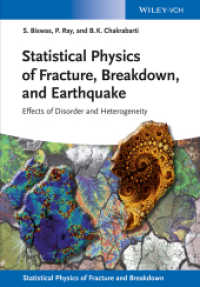- ホーム
- > 洋書
- > 英文書
- > Religion / Ethics
Full Description
The twenty-three discourses presented in this volume have a long textual history that ascribes them to St. Gregory the Illuminator of Armenia (d. 328), a prevalent view that lasted through the nineteenth century. Armenian scholarship through the last century has tended to ascribe them to St. Mashtots', the inventor of the Armenian alphabet (d. 440). In his critical introduction to this first-ever English translation of the discourses, Terian presents them as an ascetic text by an anonymous abbot writing near the end of the sixth century. The very title in Armenian, Ya?axapatum ?a?k', literally, "Oft-Repeated Discourses," further validates their ascetic environment, where they were repeatedly related to novices. For want of answers to introductory questions regarding authorship and date, and because of the pervasive grammatical difficulties of the text, the document has remained largely unknown in scholarship.
The discourses include many of the Eastern Fathers' favorite theological themes. They are heavily punctuated with biblical quotations and laced with recurring biblical images and phraseology; the doctrinal and functional centrality of the Scriptures is emphasized throughout. They are replete with traditional Christian moral teachings that have acquired elements of moral philosophy transmitted through Late Antiquity. Echoes of St. Basil's thought are heard in several of them, and some evidence of the author's dependence on the Armenian version of the saint's Rules, translated around the turn of the sixth century, is apparent. On the whole they show how Christians were driven by the Johannine love-command and the Pauline Spirit-guided practice of virtuous living, ever maturing in the ethos of an in-group solidarity culminating in monasticism.








